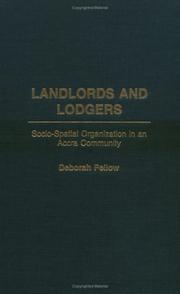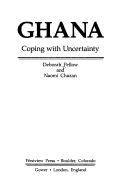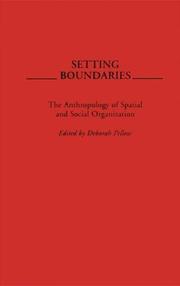| Listing 1 - 8 of 8 |
Sort by
|

ISBN: 9780226653976 0226653978 0313012393 9780313012396 0275976009 9780275976002 1280422882 9781280422881 9786610422883 6610422885 9798400676444 Year: 2002 Publisher: Westport, Conn. : London : Praeger, Bloomsbury Publishing,
Abstract | Keywords | Export | Availability | Bookmark
 Loading...
Loading...Choose an application
- Reference Manager
- EndNote
- RefWorks (Direct export to RefWorks)
Human territoriality --- Spatial behavior --- Hausa (African people) --- Muslims --- Territorialité humaine --- Comportement spatial --- Haoussa (Peuple d'Afrique) --- Musulmans --- History --- Social conditions --- Histoire --- Conditions sociales --- Accra (Ghana) --- Social conditions. --- Mohammedans --- Moors (People) --- Moslems --- Muhammadans --- Musalmans --- Mussalmans --- Mussulmans --- Mussulmen --- Religious adherents --- Islam --- Abakwariga (African people) --- Afuno (African people) --- Haoussa (African people) --- Hausaawaa (African people) --- Hausas --- Hausawa (African people) --- Haussa (African people) --- Hawsa (African people) --- Mgbakpa (African people) --- Ethnology --- Behavior, Spatial --- Proxemic behavior --- Space behavior --- Spatially-oriented behavior --- Psychology --- Space and time --- Territorial behavior --- Territoriality, Human --- Human geography --- History. --- #SBIB:39A73 --- #SBIB:39A11 --- Etnografie: Afrika --- Antropologie : socio-politieke structuren en relaties --- Territorialité humaine --- Accra (Ghāna) --- Akkra (Ghana) --- Akra (Ghana) --- Nkran (Ghana) --- أكرا (Ghana) --- Горад Акра (Ghana) --- Horad Akra (Ghana) --- Акра (Ghana) --- Аккра (Ghana) --- Ακκρα (Ghana) --- Acra (Ghana) --- Akrao (Ghana) --- 아크라 (Ghana) --- Ak'ŭra (Ghana) --- Аккрæ (Ghana) --- Akkræ (Ghana) --- אקרה (Ghana) --- Aḳrah (Ghana) --- アクラ (Ghana)
Book
ISBN: 9781800733794 9781800733787 Year: 2022 Publisher: New York Berghahn Books
Abstract | Keywords | Export | Availability | Bookmark
 Loading...
Loading...Choose an application
- Reference Manager
- EndNote
- RefWorks (Direct export to RefWorks)
Focusing on a sub-set of the Dagomba of northern Ghana, this book looks at the first generation to go through secondary school in the north. After university and post-graduate education, they relocate to Accra, the capital, hundreds of miles south. They crossed social and physical space and have become cosmopolitan while holding on to tradition and attachment to their home town. This bridge generation are patrons to those living up north. This book charts their path into elite status and argues that they use the tools gained through education and social connections to influence politics back home.
Dagbani (African people) --- Dagbani (African people) --- Dagbani (African people) --- Education, Secondary. --- Educational sociology. --- Elite (Social sciences) --- Elite (Social sciences). --- Enseignement secondaire --- Social conditions. --- Sociologie de l'éducation --- Élite (Sciences sociales) --- Politics and government. --- 2000-2099. --- Ghana. --- Ghāna --- Conditions sociales
Book
ISBN: 9781800733787 Year: 2022 Publisher: New York : Berghahn,
Abstract | Keywords | Export | Availability | Bookmark
 Loading...
Loading...Choose an application
- Reference Manager
- EndNote
- RefWorks (Direct export to RefWorks)
"Focusing on a sub-set of the Dagomba of northern Ghana, this book looks at the first generation to go through secondary school in the north. After university and post-graduate education, they relocate to Accra, the capital, hundreds of miles south. They crossed social and physical space and have become cosmopolitan while holding on to tradition and attachment to their home town. This bridge generation are patrons to those living up north. This book charts their path into elite status and argues that they use the tools gained through education and social connections to influence politics back home"--
Dagbani (African people) --- Dagbani (African people) --- Dagbani (African people) --- Education, Secondary. --- Educational sociology. --- Elite (Social sciences) --- Elite (Social sciences). --- Enseignement secondaire --- Social conditions. --- Sociologie de l'éducation --- Élite (Sciences sociales) --- Politics and government. --- 2000-2099. --- Ghana. --- Ghāna --- Conditions sociales
Book
ISBN: 1003003532 1000684229 0367431718 1032211946 100068427X 9781000684278 9781003003533 9781000684223 Year: 2023 Publisher: New York : Routledge,
Abstract | Keywords | Export | Availability | Bookmark
 Loading...
Loading...Choose an application
- Reference Manager
- EndNote
- RefWorks (Direct export to RefWorks)
"This volume offers valuable anthropological insight into urban Africa, covering a range of cities across a continent that has become one of the fastest urbanizing geographic areas of the globe. Consideration is given to the structures, social formations, and rhythms that constitute the definition of an African city, town, or urban space, and to current concepts for thinking about African cities in the twenty-first century. The contributors examine topics including notions of belonging, the effects of globalization, colonialism and transnationalism on African urban life, the cultural dimensions of infrastructure and public resources, mobility, labor issues, spatial organization, language, and popular culture trends, among other themes. The book reflects on how the ethnography of urban Africa fits within anthropology and urban studies, and on new theoretical concepts and methodologies that can be created through anthropological fieldwork in African cities. It will be of particular interest to scholars and students from anthropology, African studies and urban studies, as well as sociology and geography"--
Urban anthropology. --- Anthropology, Urban --- Ethnology --- Land use, Urban --- Urbanization

Abstract | Keywords | Export | Availability | Bookmark
 Loading...
Loading...Choose an application
- Reference Manager
- EndNote
- RefWorks (Direct export to RefWorks)
Ghana --- Economic conditions --- -Economic conditions --- -Politics and government --- -Social conditions. --- Chia-na --- Gana --- Republic of Ghana --- Ganah --- Government of Ghana --- Rèpublica du Gana --- Qana --- Qana Respublikası --- Gana ka Fasojamana --- Republik Ghana --- Гана --- Gana Respublikaḣy --- Hana (Ghana) --- Рэспубліка Гана --- Rėspublika Hana --- Република Гана --- Republika Gana --- Ghanská republika --- Gweriniaeth Ghana --- Gáana --- Ghana Vabariik --- Γκάνα --- Gkana --- Δημοκρατία της Γκάνας --- Dēmokratia tēs Gkanas --- República de Ghana --- Ganao --- Ghanako Errepublika --- Tjóðveldið Gana --- République du Ghana --- Poblacht Ghána --- Yn Ghaney --- Ghaney --- Pobblaght ny Ganey --- Poblachd Ghàna --- Ганмудин Орн --- Ganmudin Orn --- 가나 --- 가나 공화국 --- Gana Konghwaguk --- Ochíchìíwú Ghana --- Ганæ --- Ganæ --- Республикæ Ганæ --- Respublikæ Ganæ --- IGana --- Repubblica del Ghana --- גאנה --- רפובליקת גאנה --- Republiḳat Ganah --- ガーナ --- Politics and government --- Social conditions.

ISBN: 0897894286 Year: 1996 Publisher: Westport Bergin and Garvey
Abstract | Keywords | Export | Availability | Bookmark
 Loading...
Loading...Choose an application
- Reference Manager
- EndNote
- RefWorks (Direct export to RefWorks)
Boundaries --- Human territoriality --- Personal space --- Spatial behavior --- Social aspects
Book

ISBN: 9780857452849 0857452843 Year: 2007 Publisher: New York Oxford
Abstract | Keywords | Export | Availability | Bookmark
 Loading...
Loading...Choose an application
- Reference Manager
- EndNote
- RefWorks (Direct export to RefWorks)
Book

ISBN: 9781782387312 1782387315 9781782387305 1782387307 Year: 2015 Publisher: New York Oxford
Abstract | Keywords | Export | Availability | Bookmark
 Loading...
Loading...Choose an application
- Reference Manager
- EndNote
- RefWorks (Direct export to RefWorks)
Anthropologists have acted as experts and educators on the nature and ways of life of people worldwide, working to understand the human condition in broad comparative perspective. As a discipline, anthropology has often advocated - and even defended - the cultural integrity, authenticity, and autonomy of societies across the globe. Public anthropology today carries out the discipline's original purpose, grounding theories in lived experience and placing empirical knowledge in deeper historical and comparative frameworks. This is a vitally important kind of anthropology that has the goal of im
| Listing 1 - 8 of 8 |
Sort by
|

 Search
Search Feedback
Feedback About UniCat
About UniCat  Help
Help News
News